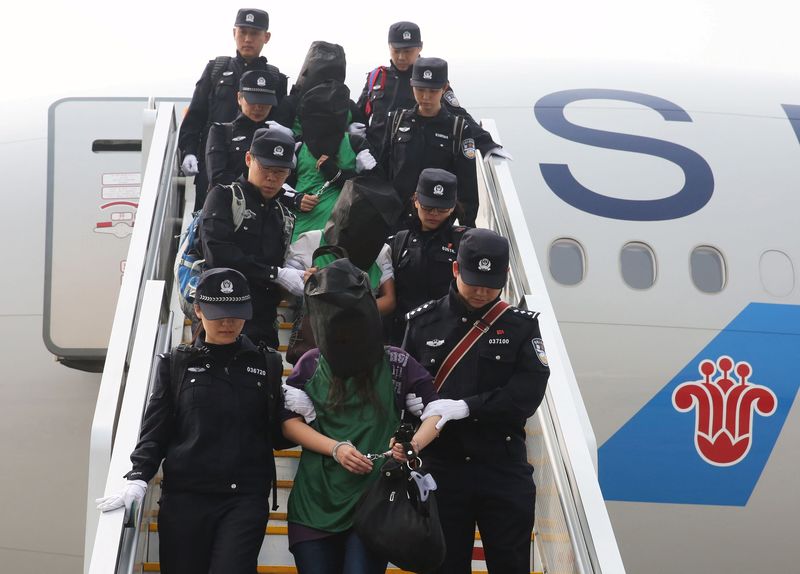By Ben Blanchard and J.R. Wu
BEIJING/TAIPEI (Reuters) - China is stepping up pressure on self-ruled Taiwan a month ahead of the inauguration of a president from a pro-independence party Beijing distrusts, signalling a rocky start for the leader of the island elected on a wave of anti-China sentiment.
In the past few weeks, China has established ties with former Taiwan ally Gambia, sent a top general to inspect troops based in a frontline province and scooped up dozens of Taiwanese from Kenya wanted in China for fraud - a move denounced by Taipei as being more about politics than crime.
And Taiwan said a hotline meant to expedite direct communication between the top government officials dealing with each other's affairs had not been answered by China twice at critical times of late.
China regards Taiwan as a wayward province to be taken back by force if necessary and wants the new government to stick to the "one China" policy agreed upon with the outgoing China-friendly Nationalist government.
Only 22 countries recognise Taiwan as the "Republic of China", with most, including Kenya, having diplomatic relations with the "People's Republic of China", with its leaders in Beijing.
Taiwan is one of China's most sensitive political issues, and a core concern for the Communist Party, trumping even Beijing's claims in the South China Sea.
Since Tsai Ing-wen and her Democratic Progressive Party won Taiwan's presidential and parliamentary elections by a landslide in January, Beijing has repeatedly warned it will be watching closely what she does. Tsai takes office on May 20.
At risk are ties that had warmed considerably when Ma Ying-jeou of the Nationalists was elected Taiwan president in 2008, ushering in regular high-level exchanges and overseeing the signing of a series of landmark economic deals.
China's Communist Party-controlled state media has not minced its words about what is at stake.
Chen Qinhao, a Taiwan expert at Beijing's elite Tsinghua University, wrote in the official People's Daily this week that Tsai risks ending lines of communication between China and Taiwan if she does not explain her policy on China.
"It won't be a matter of there being a 'high season' or a 'low season' in cross-Taiwan Strait relations," Chen wrote. "When it comes to the authoritative consultation mechanisms between the two sides, I fear it will totally shut down."
In Taipei, officials are reading the tea leaves, too.
The island's normally secretive top security agency said the Gambia move was to pressure Tsai to "fall in line with China's expectations" once in office.
Throughout, Tsai, who has said she wants peace with China and to maintain the status quo, has spoken only via her Facebook (NASDAQ:FB) or through her party.
"Beijing has no right to represent us on matters involving the deportation of Taiwanese," she wrote on Facebook last week about the forcible deportation of Taiwan nationals to China from Kenya, even as her top national security adviser called China's move "completely unhelpful" for ties between the two sides.
"DELIBERATE INDIFFERENCE"?
Taiwan says China has at times been deliberately avoiding talks.
China's most senior official in charge of Taiwan affairs was not in his office when Taipei scrambled to raise Zhang Zhijun in March about the Gambia case on a hotline set up to expedite communication between the two sides.
It took at least two days before a call could be connected last week about the Kenya matter, according to Taiwan's Mainland Affairs Council.
"What is this? Deliberate indifference," said DPP senior Liu Shyh-fang.
China's Taiwan Affairs Office did not respond to a request for comment.
China, for its part, has been incensed by the uproar over the telecoms fraud cases, saying they are simply a criminal matter.
China accused Taiwan over the weekend of disregarding Chinese victims in a case in Malaysia involving Taiwanese suspects after they were freed upon their arrival back in Taiwan. Taipei said it did not have enough evidence to detain the individuals.
Some of the attacks in Chinese state media about the telecoms fraud cases have been deeply personal, even if Tsai was not directly named.
The People's Daily, in a front page commentary in its overseas edition on Tuesday, lambasted "certain representatives of popular will who sit idly by on their high salaries and votes they've won" to portray themselves as saviours and heroes rather than thinking about fighting crime.
Beijing wants Tsai to clearly state what her policy is on relations with China, but she is keeping quiet.
In the background, China's military lurks.
Xu Qiliang, a vice chairman of the Central Military Commission which runs China's military, last week visited Fujian province, which lies opposite Taiwan, urging troops to strengthen efforts to form strong armed forces.
Last month, the military commemorated a key but little-known victory against Nationalist forces following their fleeing to Taiwan in 1949 at the end of the Chinese civil war, in a reminder China's military still considers the island one of its strategic priorities.

"We must shout out the words 'reunify Taiwan'," Wang Hongguang, a lieutenant general and former deputy commander of China's Nanjing military region, wrote in an online commentary last month.